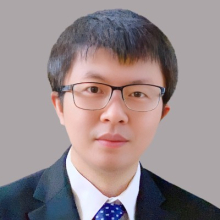CBE 298: Development and Understanding of New Concept Catalytic Materials for Environmental Applications

Abstract: Supported metal single-atom catalysts (SACs) and fully exposed cluster catalysts offer remarkable advantages in catalysis, achieving nearly 100% utilization of supported metals, particularly high-cost noble metals. The intrinsic catalytic performance of SACs and cluster catalysts is highly dependent on the local coordination environment of the isolated or ensembled metal atoms. However, precise control over the coordination structure of metal atoms, especially on industrially practical supports, and the optimization of their intrinsic activity for efficient environmental catalysis remain significant challenges. This talk will explore strategies for controlling the coordination environment and driving the structural evolution of metal single atoms into more robust catalytic sites, as well as controlling the local reaction atmosphere, with greatly enhanced activity for critical environmental applications such as CO, NH3, hydrocarbon oxidations and nitrogen oxides reduction etc. These insights will shed light on the precise control of the local coordination structure of active metal sites and reaction microenvironment, paving the way for achieving both 100% atomic utilization efficiency and optimal intrinsic catalytic activity for targeted environmental applications.
Bio: Fudong Liu has been working in heterogeneous catalysis, environmental catalysis, pollution control, greenhouse gas reduction/utilization, hydrogen production and synchrotron-based technique (X-ray absorption spectroscopy) for material characterization for more than 20 years, in both academia (Tsinghua University, Chinese Academy of Sciences, University of California, Berkeley/Lawrence Berkeley National Laboratory, University of Central Florida, University of California, Riverside as a tenured associate professor) and industry (BASF Corporation). He has published 160+ peer reviewed papers with 13,000+ citations and H-index of 61 (Google Scholar), applied 40+ patents with 24 granted so far, and published four book chapters in heterogenous catalysis field. Liu’s group has been funded by US DOE, US EPA, NSF, BASF Coporation etc. He received the 2009 CAS P&G Scholarship, 2010 CAS President Scholarship, 2011 CAS Excellent Doctoral Dissertation Award, 2012 International Association of Catalysis Societies (IACS) Young Scientist Award, 2013 Lu Jiaxi Young Talent Award, 2014 National Science &Technology Progress Award, 2019 National Natural Science Award, China, 2020 TechConnect Defense Innovation Award, 2023 Research Incentive Award at University of Central Florida, 2024 RINENG (Results in Engineering, Elsevier) Distinguished Scientist Award, 2024 CAPEES-Carina Frontier Research Award, 2025 CAPEES Founding President Best Paper Award, and 2025 Team Award from the U.S. Department of Energy’s Vehicle Technologies Office (VTO) etc.
Share
Related Content
| Attachment | Size |
|---|---|
| 882.97 KB |
Upcoming Events
-
MSE 298 Seminar: Electrocatalysis as Enabling Technology for Decarbonization
-
CEE Ph.D. Defense Announcement: Modeling the Spatiotemporal Heterogeneities of Electric Vehicle Adoption in the United States through Sentiment-Mediated Mechanisms - A Large Language Model-Assisted Data-Fusion Framework
-
EECS Seminar: Random Thoughts After More Than 60 years in the Trenches
-
MAE 298 Seminar: Machine Learning Acceleration of Turbulent Combustion and Nonequilibrium Flow Predictions
-
CBE 298: Green Steel: Design, Supply Chain, H2 Storage and Dispatch Strategies
